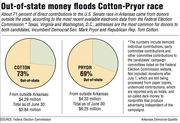More than $2 of every $3 donated directly to the campaigns of Arkansas' U.S. Senate candidates have come from people and interests outside the state, according to an Arkansas Democrat-Gazette review of federal campaign contribution records.
RELATED ARTICLES
http://www.arkansas…">Election to quiet ad blitz in statehttp://www.arkansas…">7 races decide state majority partyhttp://www.arkansas…">2 parties hopeful of holding power when dust settleshttp://www.arkansas…">'I Voted' sticker a badge of pridehttp://www.arkansas…">Scientists tie political views to 'disgust' levelhttp://www.arkansas…">Voter-list software for state freezes up http://www.arkansas…">Pryor, Cotton give final push over weekendhttp://www.arkansas…">Candidates for state offices tailgate at UAPB stadiumhttp://www.arkansas…">2 in Saline County vie to succeed Fitehttp://www.arkansas…">Local contested races in central Arkansas
Because direct gifts are only a slice of the overall money fueling the race between Democratic U.S. Sen. Mark Pryor and Republican U.S. Rep. Tom Cotton, the full weight of out-of-state donations almost certainly will climb when all spending is calculated after Tuesday's vote, experts in Arkansas politics and elections said.
Arkansas' U.S. Senate race has captured national attention because it will help decide which party controls that chamber for the next two years.
Experts estimate more than $55 million already has been raised and spent by the campaigns, outside political action committees and other groups, as well as nonprofits whose "dark money" often can't be sourced.
"You'll be astonished by the amount of money reported" in the Pryor-Cotton race when the campaigns are finished, said Karen Sebold, a University of Arkansas at Fayetteville assistant professor who studies campaign finance. "Both of these candidates and their supporters still have millions to drop."
For its analysis, the Democrat-Gazette looked at about $12 million in direct contributions to the two campaigns through June 30. Those are the most recent itemized gifts available in electronic format on the Federal Election Commission website. The agency is still processing paper campaign finance records submitted by U.S. Senate candidates in October.
Cotton, the 4th District congressman, had raised about 73 percent of his campaign's itemized contributions from out-of-state dwellers, the newspaper's review found.
His campaign reported $4.29 million in contributions from outside Arkansas, out of $5.84 million in total gifts.
The Cotton campaign did not respond to repeated calls and emails from the Democrat-Gazette asking how out-of-state donations have affected the race.
Pryor had accumulated about 69 percent of his direct campaign gifts from outside Arkansas, the newspaper's analysis shows.
The two-term senator had raised $4.33 million from non-Arkansas contributors by June 30, out of $6.25 million in direct gifts, election commission records show.
"It takes a tremendous amount of resources these days to make your case to voters statewide, especially in a hotly contested race like ours," Pryor campaign spokesman Erik Dorey said in an emailed response to the newspaper's questions.
Dorey's response accused Cotton's "billionaire allies" of "spending unprecedented sums on negative attack ads."
One reason out-of-state money makes up a majority of the campaigns' funds is that, in a relatively small and poor state like Arkansas, "there's just not enough money to sustain this kind of mega-election," said Hendrix College politics professor Jay Barth.
What impact does it have on candidates -- and elected officials -- when they get so much money from outside their states?
"It really does come down to the fundamental question about how concerned you are about the role of money in politics in general," Barth said. "There are those who say: 'The more the merrier.' Then there are those who say it's problematic."
Barth said he isn't surprised by the influx of out-of-state money in a nationally important race, but "I'm still a little stunned that this much money has been spent."
Here's how experts and researchers calculate the Pryor-Cotton race at $55 million-plus so far:
• About $15 million directly contributed to the campaigns.
• About $26 million from outside political action committees such as the Senate Majority PAC, House Majority PAC and American Crossroads. Researchers estimate $17 million of that spending has favored Cotton, $8 million Pryor, according to research compiled by UA's Sebold.
• About $14.5 million in "dark money" through mid-October from political nonprofits, whose donors often don't have to be reported, Sebold said. About $10.4 million has been aimed at unseating Pryor, researchers said.
The deluge of money is the result of several factors surrounding the Cotton-Pryor race, political science professor Hal Bass at Ouachita Baptist University in Arkadelphia said.
"We have what appears to be a very competitive Senate race in a very competitive national environment. Whoever wins Arkansas may win control of the Senate for the next two years. Those factors raise the stakes," Bass said.
"In addition, both candidates have extraordinarily good out-of-state connections. [Pryor] is a two-term senator and the son of a senator [former U.S. Sen. David Pryor]. In Cotton's case, he has these very close ties to the conservative network ... who see him as an up-and-comer on the national scene.
"That's going to translate into funds," Bass said.
According to the newspaper's analysis, Arkansas donors still chipped in the single largest sum from any state to either candidate -- $1.92 million for Pryor, $1.55 million for Cotton.
The other big-money states and areas for both candidates were Texas, Virginia and Washington, D.C.
For Pryor, $1.21 million in direct contributions came from Washington, D.C., $448,000 from Virginia and $379,900 from Texas.
For Cotton, it was $514,600-plus from Texas, $437,000 from Washington, D.C., and $417,000 from Virginia.
Sebold said she believes the spending is the result of "an intersection of technology, deregulation of the [campaign spending limit] laws and the magnitude of what's on the line with the election.
"Citizens are very suspicious about how campaigns are financed," Sebold said. All the outside money does raise questions in voters' minds.
Polls show "citizens ... feel they have no weight or influence. How do you compete with the [conservative] Koch brothers and dark-money liberal groups?" Sebold said.
"They want to see reforms of the system, but they're not sure exactly what."
SundayMonday on 11/02/2014


